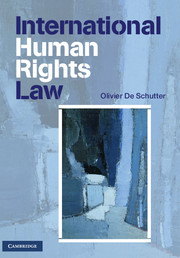Book contents
- Frontmatter
- Contents
- Table of Cases
- Table of Treaties and Conventions
- Table of Comments and Recommendations of Various International Committees
- Introduction
- PART I THE SOURCES
- PART II THE SUBSTANTIVE OBLIGATIONS
- 3 The typology of States' obligations and the obligation to respect human rights
- 4 The application of human rights in private relationships and the obligation to protect
- 5 The progressive realization of human rights and the obligation to fulfil
- 6 Derogations in time of public emergency
- 7 The prohibition of discrimination
- PART III THE MECHANISMS OF PROTECTION
- Index
7 - The prohibition of discrimination
from PART II - THE SUBSTANTIVE OBLIGATIONS
- Frontmatter
- Contents
- Table of Cases
- Table of Treaties and Conventions
- Table of Comments and Recommendations of Various International Committees
- Introduction
- PART I THE SOURCES
- PART II THE SUBSTANTIVE OBLIGATIONS
- 3 The typology of States' obligations and the obligation to respect human rights
- 4 The application of human rights in private relationships and the obligation to protect
- 5 The progressive realization of human rights and the obligation to fulfil
- 6 Derogations in time of public emergency
- 7 The prohibition of discrimination
- PART III THE MECHANISMS OF PROTECTION
- Index
Summary
INTRODUCTION
It is one of the purposes of the United Nations to ‘promot[e] and encourag[e] respect for human rights and for fundamental freedoms for all without distinction as to race, sex, language, or religion’ (Article 1, para. 3 of the UN Charter; see also Article 55(c), in chapter IX on international economic and social co-operation). The Universal Declaration on Human Rights (UDHR) reflects this emphasis on the prohibition of discrimination, by stating that ‘[a]ll human beings are born free and equal in dignity and rights' (Art. 1, first sentence), and by providing: ‘Everyone is entitled to all the rights and freedoms set forth in this Declaration, without distinction of any kind, such as race, colour, sex, language, religion, political or other opinion, national or social origin, property, birth or other status' (Article 2, first para.). Article 7 of the UDHR, which extends the scope of the requirement of non-discrimination beyond the enjoyment of the rights listed in the Declaration, also clearly imposes a positive obligation in this regard on the Member States of the United Nations: ‘All are equal before the law and are entitled without any discrimination to equal protection of the law. All are entitled to equal protection against any discrimination in violation of this Declaration and against any incitement to such discrimination.’
- Type
- Chapter
- Information
- International Human Rights LawCases, Materials, Commentary, pp. 561 - 726Publisher: Cambridge University PressPrint publication year: 2010



